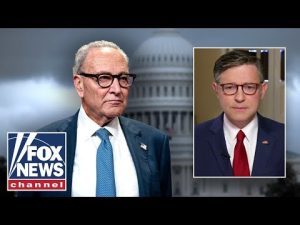In a world where international relations can feel more like a game of chess than a team sport, the dynamics between the United States and the likes of China and Russia are as important as ever. Recent discussions highlighted this complexity, particularly the interplay between Donald Trump and Joe Biden. Observers have noted the surprising synergy between Trump and Biden, especially when it comes to addressing global concerns. It’s clear that the stakes are high, and maintaining a stable relationship with China is paramount. The potential for a more equitable trade dynamic looms large, and some analysts believe that progress could be on the horizon.
Bill O’Reilly, a seasoned commentator and author, laid out the significance of this relationship during a recent segment. The backdrop of the discussion was rooted in not just politics but the very fabric of America’s economy. A fresh partnership with China could lead to fairer commerce, something that has been sorely lacking for years. O’Reilly’s insights from his recent trip to Beijing provided a glimpse into how Chinese officials perceive the U.S. leadership. Unfortunately, it seems that respect for Joe Biden is in short supply. In fact, during a meeting with government officials in China, it became clear that they were more concerned with how Trump would react to their actions than with any regard for Biden’s leadership.
The conversation took an interesting turn when Taiwan was mentioned. Surprisingly, this pivotal issue didn’t come up during a lengthy meeting, signaling the complexity of the agenda at hand. Economic concerns took the front seat, overshadowing pressing geopolitical matters. O’Reilly emphasized that the Chinese government is anxious about its economic stature — it’s not just about political posturing; it’s about the livelihood of 1.5 billion people. With the specter of recession looming, China’s focus appears to be less about confrontation and more about stability.
Another key component of the discussion revolved around the role of Russia in this intricate web. As the U.S. seeks to curtail China’s enabling of Russia and Iran, the challenges become even more pronounced. O’Reilly noted that while economics may dominate the agenda, the Taiwan issue stands alone and warrants its own detailed discussion. The complexity surrounding Taiwan’s status required deeper deliberation, suggesting that a simple meeting of the minds would not suffice.
As the conversation unfolded, attention turned to Trump’s recent remarks on nuclear weapons testing. Although some may speculate whether this was a serious proposal or merely a strategic maneuver to assert strength, it’s evident that the underlying message was clear: the U.S. remains vigilant. O’Reilly contextualized Trump’s statement, suggesting it was less about wanting to conduct actual tests and more about signaling to adversaries that the U.S. is not to be trifled with. The notion of “peace through strength” resonates strongly in discussions like these, reminding everyone involved that the stakes are very high.
In summary, the relationship between the United States and China continues to be a delicate balancing act, with implications that extend far beyond economics. The fates of nations rest on these interactions, making the importance of effective leadership and strategic communication ever more critical. While opinions may vary between the two leading U.S. figures, it is clear that navigating these relationships will shape the world’s landscape for years to come. Who knew diplomacy could feel like an intense game of chess, with each player cautiously strategizing their next move?







